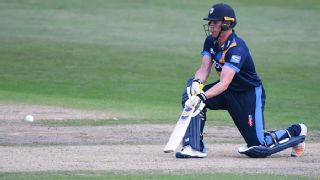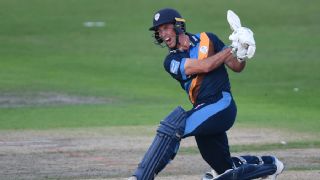|
Wayne Madsen is warming up to bowl the first over. Last season he bowled eight overs; this year he has bowled that many just in the first over of the innings. He has become a specialist first-over T20 spinner, which is very much on trend right now. The fact that Derbyshire, without doubt the worst team in the history of T20 domestic cricket in England, have managed to get to the quarter-finals, using data, research and a former IPL coach, says much for how English cricket has changed. Once a backwards cricket nation when it came to white-ball cricket tactics and growth, England is now one of the most aggressive and experimental. West Indies was the best team at the 2016 World T20 in India, but England was the most aggressive. Their run rates in ODI cricket over the last couple of years are the best cricket has ever produced. Their players are now encouraged to miss IPL seasons. They came into an ICC tournament as legitimate favourites. And they are even ripping up their precious county system to look into one of these new-fangled leagues all the kids are talking about. Things have changed. A team like Northants, which is barely thought of at all, is a powerhouse of T20 cricket and that is largely down to them focusing on T20 cricket and their Moneyball-style approach. It's not just them either, the Blast run rate this year during the group stage was the highest on record for any T20 league ever; it dipped slightly during the knockout games but is still 8.45 an over, which is huge. This all leads us back to Derbyshire, who are terrible at T20 cricket. Twice in 14-game seasons they have won only a single match. In the 14 seasons of English domestic T20 before this year, Derbyshire made the quarter-finals once. In the last decade they have a 25% win record in their completed games. They haven't had a positive win-loss record in a single one of those seasons. The time they reached the last eight was in 2005, when some counties weren't aware of T20's existence. They are, without doubt, without exaggeration, and completely objectively, the single worst T20 side in county cricket history. So last year, Kim Barnett was brought in to fix the club (the first-class team didn't win a single game either). "We'd done a top to bottom investigation into our cricket last year," he says. "Our record in T20 is abysmal; we've never been to Finals Day. And I had the authority to redefine everything, so having a T20 coach was my first bit." The good news was that Barnett had someone in mind who was a former Derbyshire legend but, more importantly, knew a bit about T20. "John Wright was connected to the Mumbai Indians, and also we know him personally, after ten years at the club playing. A good guy to have in the club, and he's a good coach, coaching the Indian team as well." But here's the kicker, Wright was brought in only as a T20 coach. He wouldn't be coaching the first-class or one-day teams, just the T20 team. Barnett created the first ever T20 specialist coach in county cricket. "They had given me authority as we had been bottom of the County Championship and we'd never been to Finals Day, so I had authority to do it how I thought best." Barnett also hired Imran Tahir, one of the world's most effective T20 bowlers. "I sort of thought, if I get Imran here and John, it'll be a good start and people might think things are happening at the club. So when we went to sign other people, it might just persuade them we are moving in the upwards direction." Wright is no ordinary coach; he's sort of the coach's coach. One of those talented-but-battling Test players of the 1980s who got the absolute most out of himself, and was articulate enough to write entertaining books about it and explain to others the best way to improve themselves. As an outsider from New Zealand, he coached India and somehow seemed to come out of it with a more positive reputation than when he started. And if you read his early book, you also realise how he was ahead of the curve when it came to thinking about the game. Before the 2003 World Cup, he was talking about getting the most from India's star batsmen after looking at the stats. He talks about how when they hit a boundary, the pressure never went off them. What got the pressure off them was scoring consistently, not three dots and a four. He doesn't give that theory a name in his book, but over the last few years cricket data analysts have called it "activity rate". This is not just an affable Kiwi with a solid cricket background; this is a first-rate cricket mind that was ahead of the curve.  If Wright is no longer on the cutting edge of the T20 revolution (he laughed when asked if he was a T20 pioneer), he's certainly not far from it. After being the coach of Mumbai Indians - currently one of cricket's most data-dependent sides - he has stayed on as their scout and advisor. Derbyshire managed to get a man with decades of cricket knowledge, a profound personal connection to their club, one of the world's most respected coaches, who also works within one of cricket's most evolved T20 teams. But the IPL and Blast are completely different beasts. There are the financial pressures of a small-town team like Derbyshire. And then there is the fact this isn't just a team of T20 guns; you have to build your team around whoever is already in the larger squad. Wright wasn't happy when he looked at the numbers last year. "When I looked at the stats of previous T20 performances, we were ranked 17th in both batting and bowling - in conceding runs per over and in runs scored." He looked to strengthen the bowling side. "Bowling is important, as is fielding, as they are your defensive side," he says. So Wright brought in fellow New Zealander Matt Henry for the bowling. With him, Hardus Viljoen, Henry and Tahir, Derbyshire had a pretty decent bowling attack. That sorted, Barnett still had some issues. "We were probably concerned about the batting. Because we didn't have anybody who had a great name from the domestic side." Wright found a way to make the batting better, according to Barnett: "Madsen hadn't been used in T20 particularly well before. Luis Reece was new at the club. Those two made nearly a thousand runs between them." Madsen and Reece combined for 959 runs, to be exact, and scored at a decent strike rate. With their bowling good and their batting ignited, Derbyshire had the third best net run rate in the group stage and won eight games (equal most). In the last four seasons combined, they had only won 11 games. They weren't even the only side to try the specialist T20 coach - Middlesex did a similar thing with Daniel Vettori after Derbyshire went for Wright. But Vettori wasn't as successful. Vettori is the sort of coach you would expect to be the first T20 specialist. That is essentially his role; he basically came straight off the field into coaching; he's played T20 cricket, he could probably still get a few overs through if needed. Wright can't even give throwdowns anymore. Wright never played T20. He retired ten years before it existed. Gary Wilson, Derbyshire's T20 captain, says: "He's probably one of the older coaches I've worked with, but that hasn't curbed his enthusiasm. He doesn't feel old-fashioned, he scouts for Mumbai in the IPL, so he's very up to date." Because of his passion for cricket, and his intellectual interest in T20, Wright is still successful at it. "You try to do research," he says. "A bit of everything, really. You look to the way players play, how to get them out, if you can't get them out, where do you restrict them, where do you not put the ball." Wilson has been impressed by this side of Wright: "He's very thorough in his preparation, in scouting the opposition players and stuff, quite big on his data and scoring areas. He watches a lot of video." So going into the quarter-final, against Hampshire, Wright had passed on all he had seen to Wilson and his team. And then Shahid Afridi surprisingly walked out to open the batting. Afridi had been poor with the bat in this season's Blast, making 50 runs off 52 balls. He had been dropped, and also overlooked at critical moments, when his hitting could have won games. And now he was opening the batting. Wright first started coaching against Afridi almost 20 years ago; his research on him was deep. "I always leave it up to the captain - you can't lead teams from the sideline," he says. "You trust them to make the right decision. There was the argument, if Afridi came out, you know - maybe try seam."  Madsen was warming up, Afridi was walking out, and Wilson did consider it. "Yeah we could have gone to seamers," he says now. Instead he stuck with Madsen's handy offspin. And that wasn't the only decision Wilson made. "I took two steps back at midwicket, because it was Afridi."
Madsen was warming up, Afridi was walking out, and Wilson did consider it. "Yeah we could have gone to seamers," he says now. Instead he stuck with Madsen's handy offspin. And that wasn't the only decision Wilson made. "I took two steps back at midwicket, because it was Afridi."
First ball, Afridi mishit a shot towards midwicket that landed, more or less, two paces in front of Wilson. The next five balls of the over contained four boundaries. Later Madsen had a chance to catch Afridi; he didn't take it. So their star of the season was smashed out of the attack first over, before dropping a simple catch. The rest of the bowlers were hit too, and their captain backed what they had done all year. Afridi made 101 off 43 balls. "He got a hundred in a 50-over game when I was coaching India and Bob Woolmer was coaching Pakistan," Wright recalls, before considering Derbyshire's defeat. "It wasn't our night. Afridi took it away, past us, really. We were hurt today. I mean 200, you hope, but 250, well... we were hammered." Derbyshire took T20 seriously, came up with intelligent batting and bowling plans, had their greatest ever season, brought in county cricket's first ever T20 specialist coach, got a home quarter-final, and then Afridi came out to open for the first time that year. "Looking back now, would I have bowled a seamer in the first over? Yeah, because he might not have gone for that many and Afridi might not have got a hundred," Wilson says. T20 is 240 moments; Wilson and Derbyshire made a mistake on the first one, and never got back in the game. Had Derbyshire not appointed Wright and taken their T20 so seriously, they wouldn't have even had the chance have their hearts broken by Afridi in their second ever quarter-final. This is just a lesson for next year. As the 63-year-old Wright says of himself, and really everyone else in cricket: "I'm still learning T20."
|

